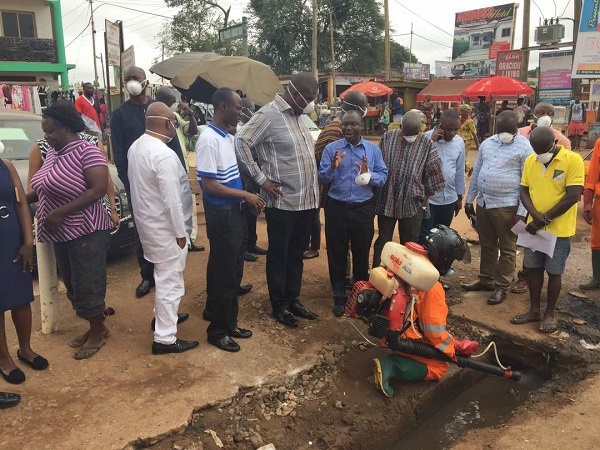 Members of the Parliamentary Select Committee at the site at Santasi, Ashanti Region
Members of the Parliamentary Select Committee at the site at Santasi, Ashanti Region
The Nationwide Mosquito Control Program is making significant impact in reducing high mortality and morbidity rates in the Ashanti Region.
Members of the Parliamentary Select Committee on Health noticed the significant impact the program is having in reducing malaria in the Kumasi Metropolis during their visit to one of the mapped out sites for the implementation of the program.
The team, as part of a three-day tour to assess the state of healthcare interventions, projects and programs in the region, visited Santasi in Kumasi to monitor progress as far as the impact of the program is concerned.
The committee lauded Zoomlion for its effective role in reducing malaria in the Ashanti Region through the Nationwide Mosquito Control Program.
Zoomlion, as part of efforts to reduce the threat of mortality and morbidity posed by malaria in various parts of the country, was tasked, in line with government’s commitment to dealing with malaria, to implement the Nationwide Mosquito Control Program in 2009.
The program’s goal is to substantially reduce mosquito population in order to eliminate malaria and other mosquito-transmitted diseases from the country through the prevention of the breeding of mosquitoes, reducing the population of mosquitoes and increasing communities’ awareness on proper environmental sanitation.
Program Manager for the intervention, Ebenezer Addae, briefing members of the committee said that the programme is contributing greatly to the reduction of malaria in the country, as it is targeted at dealing with the mosquito larvae from the very roots.
He explained, that since its inception, the Nationwide Mosquito Control Programme has been successfully implemented in every district nationwide.
“We are in in every district, all the MMDA’s, we have a sub there, and we’ve worked closely with the health officers”.

Statistics obtained from the Ashanti Regional Health directorate confirms that even though malaria continues to be among the top five reported cases at hospitals in the region, there has been a consistent decline in the number of cases by approximately 28 per cent in the last three years.
This is as a result of a number of interventions, one of which is the Nationwide Mosquito Control Programme (NAMCOP). NAMCOP focuses on activities such as larviciding and larval source management (LSM) to prevent breeding by mosquitoes.
Explaining how the program works, Mr. Addae explained that specific breeding areas for the parasites are discovered in particular communities after which larviciding; the spraying of the breeding places with a recommended chemical which kills the larvae is done. According to him, killing the larvae helps deal with the problem of having to find alternative means of killing them when they are mature.

Assembly Member for Santasi, Samuel Amankwaa, who was present also highlighted the significant impact the program has had in his area. The previous situation of having to deal with mosquitoes on a daily basis he said, has been solved following the introduction of the program in his area.
Chairman of the Parliamentary Committee on Health, Dr. Kwabena Twum-Nuamah who led the team for the visit assured, that the Committee would capture it in its Report to Parliament and government, the impact the program has had as well as make the necessary recommendations moving forward.












